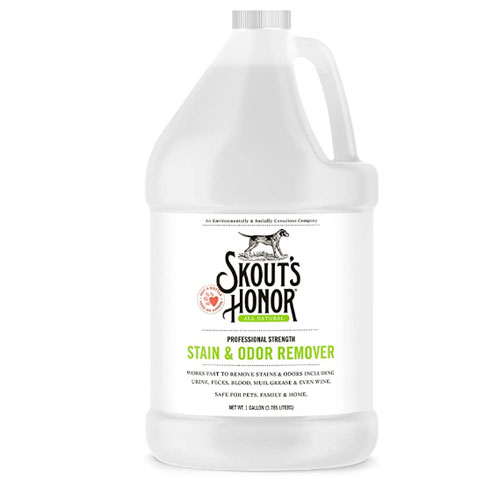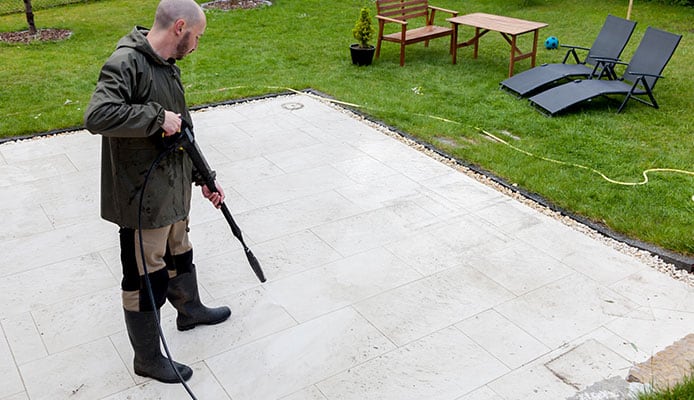
For many of us, the patio is our favorite spot. It’s a great space to catch a breath of fresh air within the comfort of our own homes. To keep the patio enjoyable, regular cleaning and maintenance are required. As many of you know, patio dirt and stains can be notoriously stubborn and difficult to remove.
But even if you have hardcore stains on the surface, there is a way of giving your patio its old shine back. Patio cleaners are specially designed products that work hard to remove any signs of dirt, plant debris, mold, algae, and anything else that might be stuck on the surface.
With all the different brands and options available, choosing the right product might seem like a complicated task. Don’t worry though, we’ll give our best to walk you through the process and help you pick the best patio cleaner for any surface. It will make the cleaning process easy and keep your patio looking great throughout the year.
OUR TOP PICK
30 SECONDS Cleaners Outdoor
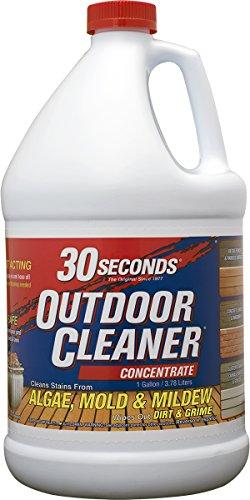
- Stand Out Features - Why We Love It
- Starts working in no time - only 30 seconds
- Safe for all types of surfaces
- Rinse with a hose (pressure washer not required)
- Environmentally friendly formula breaks down in the soil
Bottle size: 1 gallon
Coverage: 600 square feet
Surfaces: Wood, stone, concrete, and more
EDITORS CHOICE
Mold Armor
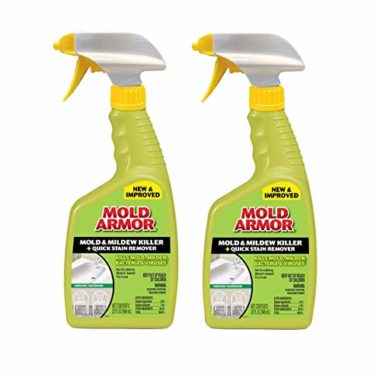
- Stand Out Features - Why We Love It
- Hose end sprayer attachment for easier use
- Strong spray with four pattern selections
- Huge coverage with a single bottle (4,500sq.ft.)
- Great for patios, decks, and house siding
Bottle size: 64 fluid ounces (0.5 gallons)
Coverage: up to 4,500 square feet
Surfaces: Wood, stone, brick, concrete
Efficient against: Dirt, grime, mildew
BEST VALUE
GP66 Green Miracle
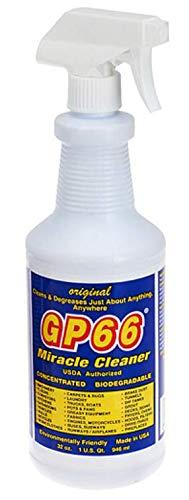
- Stand Out Features - Why We Love It
- Best formula for tough greasy stains
- Sixteen times more powerful than a regular cleaner
- NSF approved (meets public health requirements)
- Safe to use on any surface
Bottle size: 32 fluid ounces (0.25 gallons)
Surfaces: Any surface
Efficient against: Dirt, grease, grime
30 Seconds Spray and Walk Away
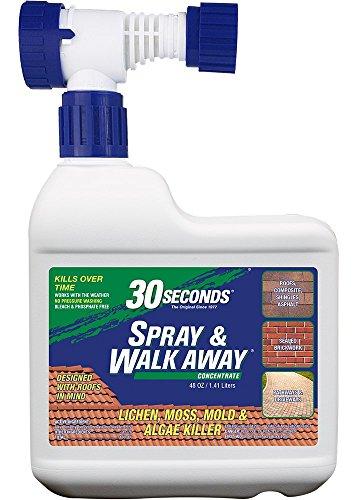
- Stand Out Features - Why We Love It
- Prolonged action efficient against moss and lichen
- Spray and walk away, no hosing or pressure washer required
- Neutral pH balance is gentle on all surfaces
- Keeps the surface clean and improves traction
Bottle size: 48 fluid ounces (0.75 gallons)
Coverage: 750 to 2250 square feet
Surfaces: Concrete, asphalt, wood, vinyl and more
Efficient against: Lichen, moss, mold, algae, mildew, grime
Skout’s Honor Professional Strength Pet Friendly
- Stand Out Features - Why We Love It
- Pet-friendly non-toxic formula
- Biodegradable and free from harmful chemicals
- Works great on all hard outdoor surfaces
- Full money-back guarantee with the purchase
Bottle size: 35 fluid ounces
Surfaces: Concrete, stone, artificial turf
Efficient against: Urine stains and odors
MasonryDefender All-Purpose Masonry and Concrete
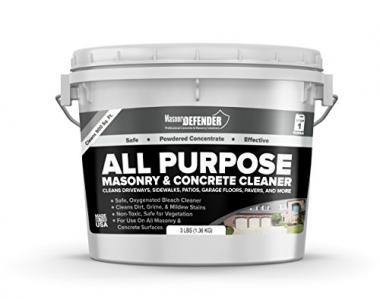
- Stand Out Features - Why We Love It
- Powder form (one pail mixes with 6 gallons of water)
- Effective on all masonry and concrete surfaces
- Oxygenated bleach formula easily removes stains
- Completely non-toxic and safe for plant life
Pail size: 3 pounds
Coverage: 900 square feet
Surfaces: Masonry and concrete
Efficient against: Dirt, grime, mold, mildew
How To Choose A Patio Cleaner – Buying Guide
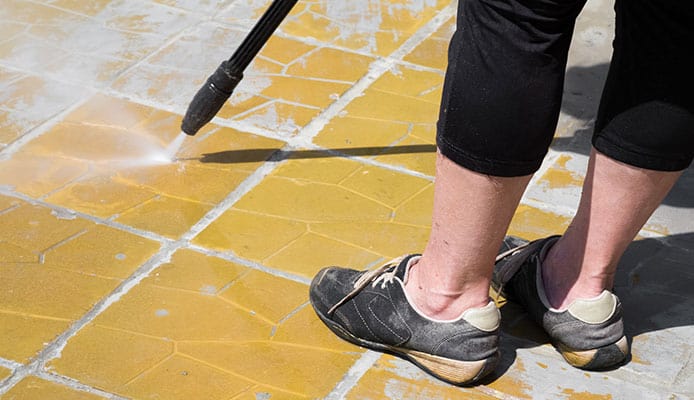
While going through outdoor patio cleaners, we were looking for two things – that it gets the job done and that it’s safe for the environment. With this in mind, the best patio cleaner won’t contain any abrasive chemicals so it’s safe to be used around children and animals. A top rated outdoor cleaner will have your patio looking fantastic in no time.
Cleaning Surface
This is probably the most important factor when looking for a patio cleaner. Think about the surface that you need to clean. There are patio cleaners for limestone, concrete, block paving, wood, and many others. Knowing this, it’s recommended that you find a product that is specially made for the surface you have.
Different surfaces won’t react the same to different chemicals – some might even get damaged. For example, a patio cleaner that contains bleach will damage a wood patio, but it’s perfectly safe to apply on stone. If a patio cleaner contains sodium hydroxide, it won’t be safe for uncoated surfaces (the chemical is too strong).
Cleaning Procedure
Depending on the active ingredient, each cleaner for patio has a different recommended cleaning procedure. Some outdoor patio cleaners have immediate results, while others take longer to work. Similarly, some products require rinsing with fresh water afterward, while others that are safe to apply and leave to dry.
If you see a path cleaner that is branded as “spray and leave”, you don’t have to scrub or remove it. The chemicals do all the work, and they are safe to leave on the patio surface. Ideally, it’s best to try and find a cleaner that requires no manual scrubbing and delivers results in a short time period.
For minimal work, a spray and leave cleaner for patio is the best option for you. However, some of these aren’t strong enough for cleaning patios that are very dirty. If your patio can’t get the glow that you want, you might want to try a different approach to cleaning a patio (scrubbing or combining with a pressure washer).
Area of Coverage
The area of coverage represents the surface that you can clean with a single bottle of a product. Besides cleaner concentration, this will also depend on how dirty the surface is (a dirty surface requires more cleaner to be applied).
Depending on the product, some patio cleaners have a denser formula than others. A dense solution will have a smaller area of coverage compared to a thin solution, but the effect will be significantly more powerful.
In relation to this, some cleaners are very concentrated and can be diluted before using them. This allows you to choose whether you need a thinner solution for a larger area, or a stronger solution for in-depth cleaning.
When you dilute a patio cleaner, it results in a larger area of coverage. On average, 5 liters of cleaning concentrate has an area of coverage of about 4,300 square feet. If you’re diluting the product, you always need to follow the instructions (for both safety and efficiency reasons).
You might also like: How To Clean Patio (Checklist)
Abrasive Substances
You should be cautious with patio cleaners that contain abrasive substances or harsh chemicals. Some patio cleaning solutions (especially concrete cleaners) have acidic or caustic chemicals included in the formula.
These types of cleaners are meant for deep cleaning and may damage more gentle materials. For example, if you have a natural patio made of wood, you should not use abrasive substances because they will likely cause permanent damage.
You should also remember that a patio cleaner with abrasive substances or caustic chemicals is not a child or pet friendly patio cleaner. If you need to apply this type of cleaner on stubborn stains, make sure to take precautions and protect yourself from coming into contact with the cleaner.
Environmentally and Pet Friendly Formula
Patio cleaners use strong substances to get the job done, so it’s important to check whether or not the substance is safe for the environment. A patio is exposed to the outdoors, which means that animals can easily get through. The best pet friendly patio cleaner won’t cause any potential harm to animals, while being completely safe for the environment too.
You should be especially cautious if the cleaner can run off the patio into your garden or plants. An environmentally safe cleaner is one that doesn’t kill the plants in the garden or damage the soil underneath.
FAQs
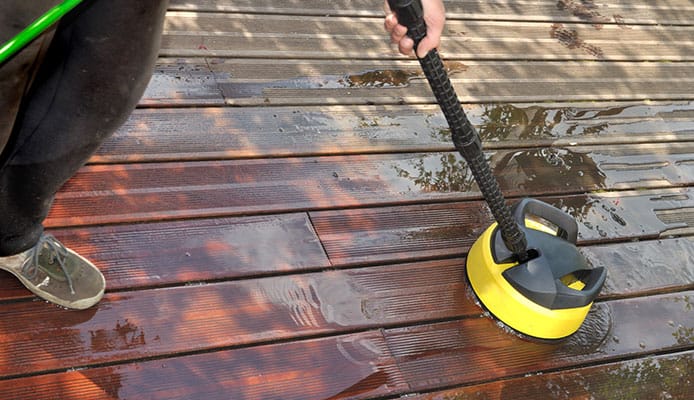
Q: What are the beWhat Are The Benefits Of Using A Patio Cleaner?nefits of using a patio cleaner?
The main benefit is keeping the outdoor surfaces clean and free from stains caused by dirt, debris, mold, or algae. A top rated outdoor cleaner will get your patio shining all year long, without the risk of damaging the surface.
As you’ve had the chance to see, a lot of different products exist with a various degree of efficiency. The best outdoor cleaner will completely remove the hassle of cleaning patio manually, so you can spend more time actually enjoying the patio.
Q: How To Properly Use A Patio Cleaner?
This is hard to answer because different products often require a different procedure, based on their active ingredient and how much time they need before you can see results. For this reason, you must follow the instructions for each particular product on how to clean patio.
Having said that, the proper use of a patio cleaner warrants that you take precautions against coming into contact with the cleaning solution. The proper procedure requires protective gear to be used (such as gloves and boots) to ensure you aren’t risking harm to yourself. This is especially important with acid or caustic chemical-based solutions.
Q: Are There Different Types Of Patio Cleaners For Different Types Of Stone And Dirt?
Yes, some patio cleaners are specially made to work better on a certain surface or against a type of stain. You’ll come across efficient concrete cleaners (like the 30 Seconds cleaners), and products that are better for other types of stone (like limestone). Some of the best patio cleaners have a more gentle formula that you can also apply on natural materials like wood.
The type and concentration of the cleaner will also correlate to how dirty your patio is. The dirtier your patio, the denser the solution you use needs to be. On top of this, combining a cleaning solution with a pressure washer will give you fantastic results.
Globo Surf Overview
A patio is often the pride and joy of your home – a place where you and your guests can catch a break and relax. A dirty patio is an unattractive sight, but an efficient cleaner for patio will keep it looking pristine and fresh.
Hopefully, our patio cleaner reviews have helped you find the right one. The best outdoor cleaner will not only remove dirt and stains, but it will also protect the surface so it remains clean and beautiful for a long time.


